By MARY DELACH LEONARD
At Greater Christ Temple Church in Tacoma, Washington, Bishop Prentis V. Johnson looks out for the health care needs of his 300 parishioners, along with their spiritual well-being.
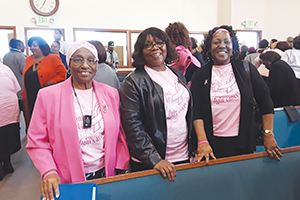
Breast cancer survivors, from left, Geraldine Brooks, Ameedah Hasan, and Dorothy Brantley participate in the Mahogany Circle of Hope Cancer Support Group's pre-pandemic breast cancer awareness event at the Shiloh Baptist Church in Tacoma, Washington. Brooks is a health minister at the church. Shiloh Baptist takes part in the FaithHealth in Action program, which provides health resources to African American, Pacific Islander and Hispanic churches in the Tacoma area.
The apostolic Pentecostal church was among the first three to join FaithHealth in Action, an innovative program developed by the nonprofit Carol Milgard Breast Center to address high rates of breast and prostate cancer in communities of color in Tacoma. The breast center is jointly owned by MultiCare Health System and Virginia Mason Franciscan Health. Virginia Mason Franciscan is part of CommonSpirit Health, a Chicago-based Catholic health system that includes Catholic Health Initiatives and Dignity Health.
FaithHealth in Action partners with churches to form ministries that bring health care resources directly to
congregations. The program, which started in 2016, initially focused on African American churches, but a three-year, $337,803 grant from the CHI Mission and Ministry Fund allowed FaithHealth in Action to expand its outreach in 2018 to include Hispanic and Pacific Islander communities and to broaden the scope of its health topics.
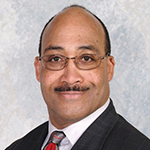
Johnson
Bishop Johnson represents the Tacoma Ministerial Alliance on the steering committee that developed FaithHealth in Action and believes it is making a difference. One of his congregants is alive today because his prostate cancer was detected early at a screening, Bishop Johnson said. And Bishop Johnson's wife had a mammogram that detected a small benign lump that was surgically removed.
"I grew up in Tacoma,'' said Bishop Johnson, 67. "This is my community — my people that I want to help. My parishioners are predominately African Americans, and the rate of breast cancer and prostate cancer is very high among us. We want to help people be proactive instead of reactive. Give people information, and then let them make their decisions based on facts."
Built by community collaboration
FaithHealth in Action began as a one-year program for African American churches to provide resources on breast health, prostate health, nutrition and patient advocacy, said Queena Tupou, coordinator of the program and marketing and outreach specialist for the Carol Milgard Breast Center.
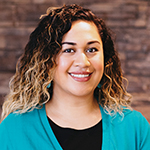
Tupou
Initial funding was contributed by health care groups that partner with the breast health center. The CHI grant enabled the center to expand its outreach and to provide a second year of resources along with a congregational health needs assessment to each church. Those additional resources address behavioral health, heart health and spiritual health topics.
Since its inception, the program has served 30 churches with combined attendance of more than 8,000 people. In 2018, the first year of the CHI grant, FaithHealth in Action trained 34 English- and/or
Spanish-speaking health ministers and had its educational materials translated into Spanish and Samoan. In the fiscal year ended June 2021, the program reached about 2,500 people who participated through 13 churches. Tupou said 16% of female church members reported having a mammogram and 6.5% of men reported having a prostate exam because of the program in FY 2021.
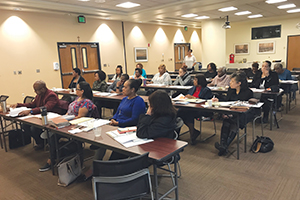
Pastors and health ministers get tips on building and strengthening their health programming at a FaithHealth in Action training in 2018. A three-year grant from the CHI Mission and Ministry Fund has allowed the program developed by the Carol Milgard Breast Center in Tacoma, Washington, to expand its duration, content and reach. The trainings of church leaders have continued online during the pandemic.
People reported that they were exercising more, eating healthier and monitoring their blood pressure.
Churches designate the leaders of their health ministries, who may be called health ministers or health leaders.
"Some of our churches have their pastors and pastors' wives taking the lead,'' Tupou said. "Some might have a member who likes to work out and cook healthy food."
Bishop Johnson said the health leader at his church was trained as a registered nurse.
Carol Milgard Breast Center's board of directors got the ball rolling in 2011 when it commissioned an epidemiology report together with the Tacoma-Pierce County Health Department to assess gaps in mammogram screenings. The study found that African American women in Pierce County had the highest rate of death from breast cancer and were more likely to die at a younger age from the disease than other women. The breast center began a community engagement project to address the disparities.
"One of the things that I always highlight is the community collaboration that built this program,'' Tupou said. "We had the buy-in of leaders from these communities before we launched.''
Entering the circle of trust
As coordinator of congregational health ministries at Virginia Mason Franciscan Health in Tacoma, Debbi Saint supports the health ministries of more than 70 churches.
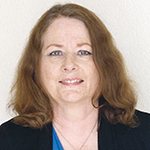
Saint
"Rather than asking people to come to us, we're going to their church — their circle of trust. And that makes a difference,'' Saint said.
FaithHealth in Action is a Carol Milgard program, stressed Saint. She is grateful that the CHI grant allowed CHI's Congregational Health Ministries to partner with FaithHealth in Action in making inroads into underserved communities. But she knows it will be a challenge to provide long-term support for the ministries.
Virginia Mason Franciscan provides support to over 70 religious congregations around South Puget Sound through Congregational Health Ministries. Most of the churches that currently belong are primarily white, Saint said, and their needs differ from the congregations served by FaithHealth in Action.
"After churches complete the two-year FaithHealth in Action program, they can be part of Congregational Health Ministries. But will they?" Saint said. "We're going to have to do something different. And I want to hear what ideas they have.''
Although the CHI grant was slated to end in 2021, enough funding remains to pay for an additional year, Saint said.
"We are continuing to look for sustained funding because that is going to be the issue — how to keep this rolling along,'' Saint said.
Building awareness and trust
FaithHealth in Action churches tailor their programming to their congregations, which vary in size from 30 people to several hundred. The program provides a $2,000 stipend to churches, a small stipend to health ministers and a small grant for hosting special events, like health fairs.
At the onset of the pandemic, FaithHealth in Action was able to shift funding to move its training program online for health ministers and to provide resources to churches for COVID-19. That also included donations from community partners of masks, and thermometers used to screen congregants before in-person services. Some churches reopened for in-person services as quickly as they could after the shutdown because they have no access to videoconferencing technology.
Testimonials gathered by FaithHealth in Action illustrate its impact:
"Working with FaithHealth in Action has helped our church realize how little we know, or how misinformed we are about the major diseases plaguing our community,'' said one minister.
Another credited FaithHealth in Action for helping undocumented people overcome fears of participating in health screenings.
FaithHealth in Action is a vital bridge between African American communities and health care organizations, said Bishop Johnson of Greater Christ Temple.
"Many African American men and women are not inclined to go to any doctor,'' he said. "It's part of our culture that we don't trust physicians because, in times past, doctors have not done us well as a race. Sharing the testimonies of church members about their experiences with health care helps build awareness and trust.''
For Tupou, the success of FaithHealth hinges on listening to communities and adapting to meet their unique needs.
"I'm Samoan and that's been key in working with Pacific Islander churches,'' she said. "It matters to them to see someone like themselves working in an organization like ours. I am a product of this community, and I understand not all but some of the experiences that they're struggling with.''